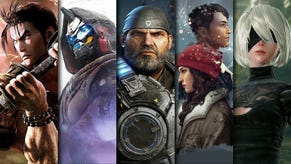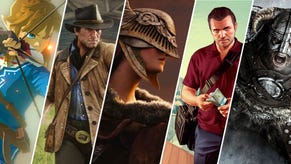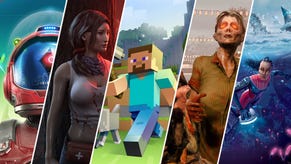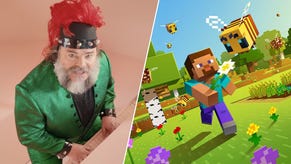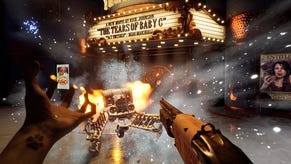How Minecraft re-shaped the gaming industry
Ahead of the full game's release today, Nathan Grayson takes look at how Minecraft changed the games industry whilst still in its infancy, and how it will further continue to revolutionise it in the future.
The scene: GDC 2011. Notch barely said two words. No big speech. He just snatched his award and walked off the spotlight-illuminated stage. He was not, however, being a Hollywood-caliber asshole. His head hadn't grown too large for his snazzy hat in the slightest. Rather, he'd already claimed so many awards that night that he simply ran out of things to say. It was almost comical by that point. “And the winner is... Minecraft. Again.”
Really, though, what else do you do with a game like Minecraft? It's already very nearly a landmark in gaming history, so of course it won by a landslide. Here's the crazy part, though: Minecraft made a tidal-wave-sized splash, but I don't think we've even begun to see ensuing the ripples that'll affect the gaming industry for years to come. You can't well copy the idea of pixelated building blocks, after all. Then you're just a “Minecraft clone.” And you can't just copy the idea of Creepers, because then I will cry.
So, on this, the day of Minecraft's official launch, let's remember the game not for what it was, but what it will be.
In it for the long haul
Actually, that may well end up being the biggest thing Minecraft contributes to the gaming industry at large: the idea that it's OK to ask people to spend money on an unfinished game. Yes, that's right: That thing you complain about all the time? When Big Game X arrives in your living room in pieces with a set of instructions that reads “Umm, oops”? Yeah, Minecraft basically did that. And everybody was fine with it. Why?
Simple: Notch was upfront about it. He never claimed that his game was complete. It's a beta. It's far from finished. There will be problems. Since that first humble build, Minecraft has improved by leaps and bounds, and the fans have been along for the whole ride. Minecraft, then, exemplifies the idea that there's no such thing as a “finished” game anymore. And believe it or not, that's a good thing.
When you're building the same game from the ground-up for years on end, it's easy to lose perspective. A particular mechanic or idea devoured months of your life, after all. It has to be fun. Why wouldn't it be? That's where a constant stream of fan feedback comes in handy. It keeps developers honest. For better or worse, fans aren't afraid to hop on the forums and caps-lock-vomit a 2000-word diatribe that essentially boils down to “This f**king sucks.”
Minecraft made a tidal-wave-sized splash, but I don't think we've even begun to see ensuing the ripples that'll affect the gaming industry for years to come.
Therein lies the potential of open development. Sure, some developers will abuse it, but – frankly – plenty already do, so why not fully embrace the positives as well as the negatives? Minecraft proudly bears that torch. Naysayers may think it's going to burn down the whole house, but just wait a few years. In the age of MMOs, free-to-play, and constant connectedness, “finished” games are on their deathbed anyway. That antiquated expectation's only putting a limit on how much games can improve. Fortunately, Minecraft has now laid down an excellent blueprint, and – more importantly – it's shown that it works.
Play, create, share
When LittleBigPlanet was first announced, it was supposed to set the world on fire. (Not literally, of course – as incredible as adorable little Sackamajigs grinning wildly and saying, “The voice tells me to burn things” would be...) But it hasn't. It's seen decent success, yeah, but the number of gamers who love to destroy still far outweighs the contingent that looks to constantly create.
Part of that, I think, lies in the division between playstyles in games like LBP, Modnation Racers, and Microsoft's Kodu. You create and then you play. Sure, the interfaces for creation are far more intuitive than, say, cracking a textbook and then cracking yourself right in the brain until – tah-dah! – you know how to code, but they're not quite the game. That is to say, it's still a means to an end. For many players, the appeal isn't in painstakingly constructing some labyrinthine maze of hop and boppery. It's about experiencing the finished products of the relatively small percentage of folks who do dig that stuff.
Enter Minecraft. In short, it filled in that abyssal canyon between playing and creating. The two are always one-in-the-same. While, say, LBP is a platformer/racer/puzzler/etc in which you can also create levels, Minecraft puts creation front-and-center. Of course, that may be changing with the arrival of dragons that sound like the end result of a night of passion between Skyrim and a bulldozer (don't think about it), but there's no doubting what gave the game its initial appeal.
Lol, PC gaming
No two ways about: Big-budget triple-A gaming on PC is in shambles. Pirates plunder everything that's not bolted down, in a safe, and wired to explode if someone so much as thinks about plucking a cookie from the cookie jar, and many publishers aren't even trying anymore. Inexplicable delays, glitch-ridden ports, infuriating interfaces, obnoxious DRM – the writing's on the wall.
A couple years ago, I would have told you that PC was circling the drain as a gaming platform. It wasn't “dead” – as many people like to say – but the future certainly wasn't looking too bright. PC needed something. Anything. Its old identity as hottest hotrod on the block wasn't cutting it anymore. The PC gaming master race was in danger of ending up in one of those overly sentimental wildlife preserve commercials.
Minecraft, in part, helped provide PC with a renewed sense of identity. Granted, it definitely didn't do it single-handedly. Hundreds – maybe even thousands – of other indies shouldered their own portion of the weight. But those games were the arms, legs, and sexy, sexy clavicles. Minecraft was the face. It forced people to pay attention. It carried the widespread appeal needed to validate the indie movement not only in the eyes of hardcore PC fanatics, but with people who barely touched games at all.
Minecraft, in part, helped provide PC with a renewed sense of identity. It forced people to pay attention.
The PC scene and the indie scene, of course, are not intrinsically linked. There is, however, tons of overlap, and both sides had a new success story to rally behind in Minecraft. Did it overshadow a few other equally deserving indies? Probably. But in the long run, that level of explosure will prove more gift and less curse.
And odds are, Minecraft will be there to see the day when it does. Sure, Mojang's just about to rip off the “beta” Band-Aid and reveal a tattoo that says “Done! And also dragons for some reason,” but it's not even close to stopping. As Notch himself put it: “It's a bit tricky to really do a release for Minecraft as we keep updating it all the time... We’ll keep adding features after the release as well, so it’s really more of a milestone when we finally get rid of the Beta label, and some kind of goal for us to work towards.”
Where will it end up? Who knows? But winning a truckload of awards and revolutionizing the gaming industry as we know it before officially launching, I'd say, is a pretty decent place to start.


